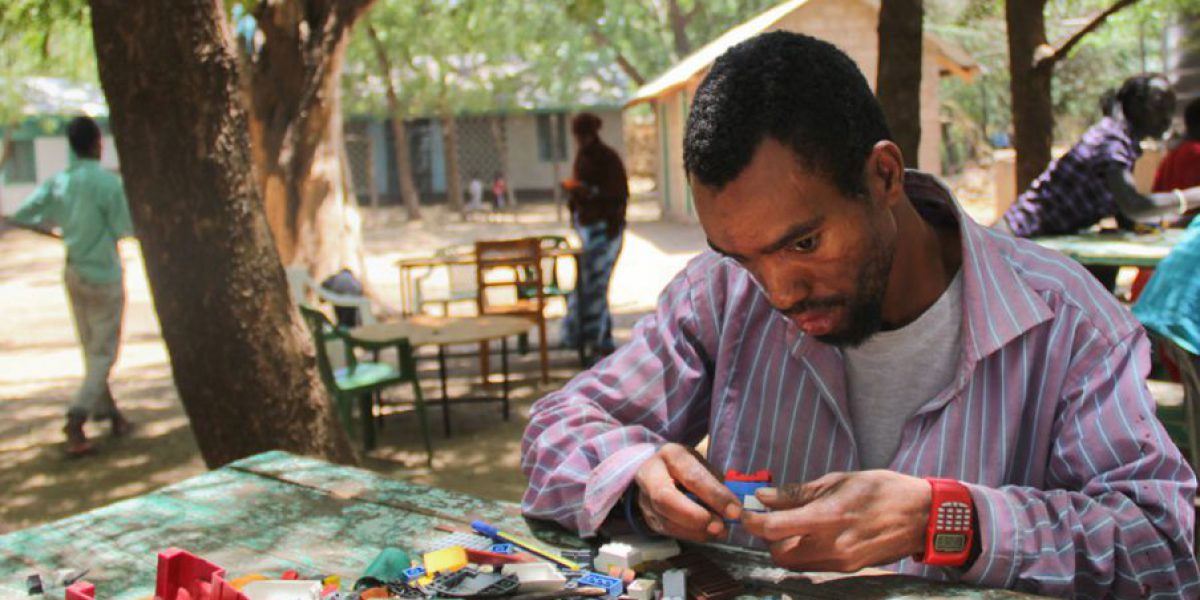Kenya: JRS Offers Hope Through Special Needs Education
03 May 2016|Michael Onyango

Even though I cannot see, I know more than many of you who can see, and that is what is important for me.” Rhoda Atong Majok is a South Sudanese refugee who lives in Kenya’s enormous and remote Kakuma camp. She is blind but nonetheless managed to score good marks in primary school, enabling her to continue to secondary level.
Like Rhoda, most refugees see education as an eye opener – in one way or another. Rhoda went to primary school outside Kakuma camp on a Jesuit Refugee Service scholarship program that sponsors 37 children with disabilities or with special protection needs. JRS covers the school fees and the cost of books, uniforms, medicine and transportation for the students to go to specially selected boarding schools.
Each expresses their appreciation for the chance to study in a different way. Mary Angel comes from the Democratic Republic of Congo. Once, when she saw me, Mary Angel jumped up and said, flapping her arms up and down: “I thank JRS for giving me wings to fly!” Mary Angel has no other relative in the camp and she has endured terrible ordeals in her young life. But now she is happy that she can learn. Not only: Mary Angel has found a home away from home in a JRS safe haven that offers temporary protection.
The scholarship program and safe haven are part of a wide range of services that JRS offers to refugees in Kakuma who have more serious protection concerns than others. This could be because they have a disability, or struggle with mental health challenges, or are at risk of sexual violence. The JRS team runs five center that offer education, life skills, and vocational training, with an emphasis on creative art. For those who need additional help, there is physiotherapy and speech therapy. Individual and group counselling are always available. Each child has an individualized care plan and the aim is to enable them to attend mainstream schools one day.
The close attention devoted by JRS to the care and education of refugees with disabilities serves a twofold purpose: by helping them to develop their unique potential, we also raise awareness about their abilities and about their right to have opportunities that are equal to those enjoyed by others. This increased awareness helps reduce the stigma that still attaches to disability in many societies among immediate family members as well as the community at large.
As service providers, I believe that our concern should be the “value added” to the life of the individual we serve. I recently visited the child protection office of another NGO and met one of our former students who cannot hear or speak. Seeing my JRS identity card, he grabbed paper and pen and proudly wrote: “I am a child of JRS, you made me who I am. Look, I am sitting at a desk now.”
Given how much can be achieved by helping children with disabilities to continue their education, my heart bleeds, because I know that right now we cannot give more scholarships due to lack of resources. When Rhoda came to the JRS office with Rose, another refugee who is blind, the education coordinator had to tell them that we cannot provide for their secondary education. They simply asked: “To whom shall we go?”
This is a very fundamental question that I believe we all ask at one time or other. But perhaps those who need more support, at one time or other in their lives, ask it more frequently and with more urgency. It is my prayer that we find the resources to help Rhoda, Rose, and other vulnerable refugees who come to us in the hope that we can show them a way forward along a path that leads to life.



